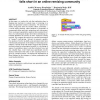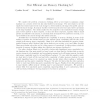26354 search results - page 91 / 5271 » How we refactor, and how we know it |
CIE
2010
Springer
14 years 1 months ago
2010
Springer
In the theory of algorithmic randomness, one of the central notions is that of computable randomness. An infinite binary sequence X is computably random if no recursive martingale...
USENIX
2003
13 years 10 months ago
2003
We present an in-kernel disk prefetcher which uses speculative execution to determine what data an application is likely to require in the near future. By placing our design withi...
IPL
2007
13 years 9 months ago
2007
In the secure communication problem, we focus on safe termination. In applications such as electronic transactions, we want each party to be ensured that both sides agree on the s...
CHI
2011
ACM
13 years 21 days ago
2011
ACM
In this paper, we explore the role that attribution plays in shaping user reactions to content reuse, or remixing, in a large user-generated content community. We present two stud...
TCC
2009
Springer
14 years 9 months ago
2009
Springer
We consider the problem of memory checking, where a user wants to maintain a large database on a remote server but has only limited local storage. The user wants to use the small ...


